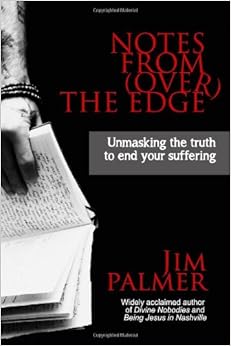(you can link to Amazon.com to buy this book HERE)
...and I have a few thoughts.
Why this book?
I was reading something that I think my Facebook friend Mike Sporer posted a few months back that intrigued me. What I expected was a book that would disassemble Christian belief systems. That wasn't necessarily what I got.
Did I like it?
I'd give it about 3 out of 5 stars.
Would I recommend it?
I depends. It might make sense to try reading Mr Palmer's first two books first. I'm not sure I'm going to go that route, but we'll see.
What was compelling about the book?
I'd say three basic themes stuck with me after finishing the book:
- The notion that the way to God is found within each of us. That sounds kind of new-agesque, but the book it self doesn't promote what I would consider "new age" philosophies.
- Our souls represent the Truth; human experience is just something we experience for a certain period of time in our existence.
- Religious traditions, dogma and the like don't do anything to help us see the truth within ourselves. In fact, they are sometimes destructive in that regard.
What wasn't so compelling about the book?
One basic criticism: Mr Palmer simply repeats the same themes over and over and over again. I few times I would read the book and basically yell "I get it! Can we move on now?". I fairness, Mr Palmer does note that this book represents his collective thoughts, written in a notebook.
Here are a few select quotes that can give you a flavor for the book:
Page 26 - "Jesus never said he would save or free anyone. He did not say 'I will set you free.' His exact words were 'When you know the truth, the truth will set you free'."
Page 41 - "...you have a body but you are not your body."
Page 44 - "You have a self-concept or self-image, which you made up in your mind, but it has nothing to do with your original Self. The concepts you hold about yourself are learned. Not one of them is actually your original Self."
Page 48 - "Truth is not something outside waiting to be discovered, it is an actuality inside to be realized."
Page 61 - "Show no preference to whom you can express compassion. Have compassion for all human being equally."
Page 83 - "The very moment you entertain the notion that peace and harmony are something you don't have that you must acquire, you have assured that there will be no inner peace and harmony. The seeking itself will be a disturbance. It is not necessary for you to seek inner peace and harmony because you ARE peace and harmony."
Page 87 - "Your original Self assumed a mind and body for a human existence. Your body and mind will decay and one day stop functioning. End of story. That's part of the deal with being human, which you signed up for."
Page 129 - "But the idea that obedience, faithfulness and spiritual maturity should result in God blessing your life with favorable circumstances is false. If this were true, God really missed the boat when it came to Jesus, who experienced levels of physical, mental, emotional, and psychological pain that few people ever have or will."
Page 135 - "Modern Christianity mostly revolves around the teachings of Saint Paul, and not Jesus. The central seeds of Institutional Christianity contain little or no teachings of Jesus."
Page 136 - "The whole notion of Jesus bringing a new hierarchy ruled by the chair of Saint Peter is a grave distortion of the whole character, life, and teachings of Jesus. Jesus' central message was about the Kingdom of God, not the kingdom of men."
Page 139 - "Jesus never said...I have come to bring you a new religion..."
Page 170 - "Fear, guild, punishment, condemnation, and shame are never a legitimate means for engendering religious devotion. Though they can be very an effective means of control and manipulation, or for achieving compliance, they are an obstacle to true enlightenment, and do great harm."
Page 171- "The fundamentalist 'Christina Gospel' damages children by telling them that they are born into this world intrinsically bad and repulsive to God. They learn that their sinfulness is to blame for the brutalization, torture, and death of God's son."
Page 188 - "Religion made half of us afraid to die, and the other half afraid to live."

No comments:
Post a Comment